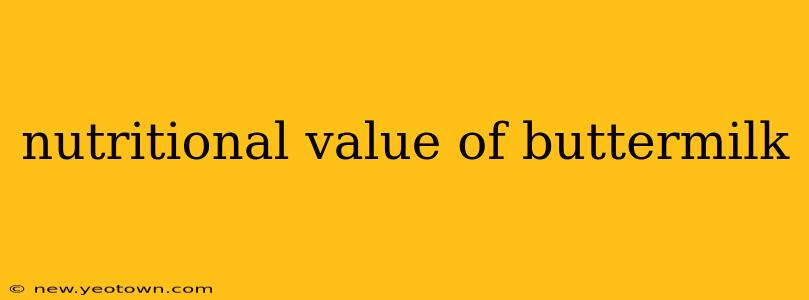Buttermilk. The name conjures up images of fluffy pancakes and creamy biscuits, but this tangy dairy drink is far more than just a baking ingredient. It’s a nutritional powerhouse, packed with vitamins, minerals, and probiotics that contribute to overall health and well-being. Let's delve into the surprising nutritional value of buttermilk and discover why it deserves a prominent place in your diet.
My journey into the world of buttermilk began with a simple question: Is buttermilk really as healthy as people say? What started as a casual inquiry blossomed into a deep dive into the scientific literature, revealing a surprisingly rich tapestry of nutritional benefits. This article shares my findings, weaving together the facts with a touch of personal experience to help you understand the true potential of this often-overlooked dairy product.
What is Buttermilk, Exactly?
Before we dive into the nutritional details, it's important to clarify what buttermilk actually is. Unlike its name might suggest, buttermilk isn't made from churning butter. Instead, it's a byproduct of butter making. Traditionally, it was the liquid remaining after churning butter from cultured cream. Today, most commercially available buttermilk is created by adding lactic acid bacteria to skim or low-fat milk, resulting in a tangy, slightly sour flavor. This process ferments the milk, creating a healthier and more digestible product.
What are the Nutritional Benefits of Buttermilk?
Buttermilk is a treasure trove of essential nutrients. Let's explore some key components and their benefits:
-
Protein: Buttermilk is an excellent source of high-quality protein, crucial for building and repairing tissues, supporting immune function, and maintaining satiety. This makes it a great addition to a weight-management plan.
-
Calcium: Essential for strong bones and teeth, calcium is abundant in buttermilk. Adequate calcium intake is particularly important throughout life, but especially during childhood and adolescence for optimal bone development.
-
Vitamin B12: This essential vitamin plays a vital role in nerve function, red blood cell formation, and DNA synthesis. Buttermilk provides a good source of B12, making it beneficial for those following a plant-based diet or those who may have difficulty absorbing this vitamin.
-
Riboflavin (Vitamin B2): Riboflavin is involved in energy production and cell growth. Buttermilk contributes to your daily riboflavin intake.
-
Probiotics: The fermentation process creates beneficial probiotics, friendly bacteria that promote gut health. A healthy gut microbiome is linked to improved digestion, immunity, and even mental well-being.
Is Buttermilk Good for Weight Loss?
Is buttermilk good for weight loss? The high protein content in buttermilk contributes to satiety, helping you feel fuller for longer and potentially reducing overall calorie intake. Its low fat content, especially in the low-fat varieties, further supports weight-management goals. However, it's important to remember that buttermilk, like any food, should be consumed as part of a balanced diet and an overall healthy lifestyle for optimal results.
What are the Potential Downsides of Buttermilk?
While generally safe and healthy, some individuals might experience discomfort from the lactose content in buttermilk. Those with lactose intolerance may experience bloating, gas, or digestive upset. In such cases, opting for lactose-free buttermilk or consuming it in moderation can be beneficial.
How Can I Incorporate Buttermilk into My Diet?
Buttermilk's versatility makes it easy to integrate into various dishes. Beyond its traditional use in baking, you can enjoy it in smoothies, soups, marinades (for extra tender meat!), and as a refreshing drink on its own. Its tangy flavor adds a unique twist to many recipes.
Is Buttermilk the Same as Yogurt?
Is buttermilk the same as yogurt? While both are fermented dairy products, they differ significantly in taste, texture, and production methods. Yogurt is typically thicker and creamier, while buttermilk has a thinner, more watery consistency and a distinctly tangy flavor.
In conclusion, buttermilk is a nutritional gem often underestimated. Its unique blend of nutrients, probiotics, and versatile flavor profile makes it a valuable addition to a healthy and balanced diet. So, next time you're at the grocery store, consider grabbing a carton of buttermilk – your body will thank you for it!

